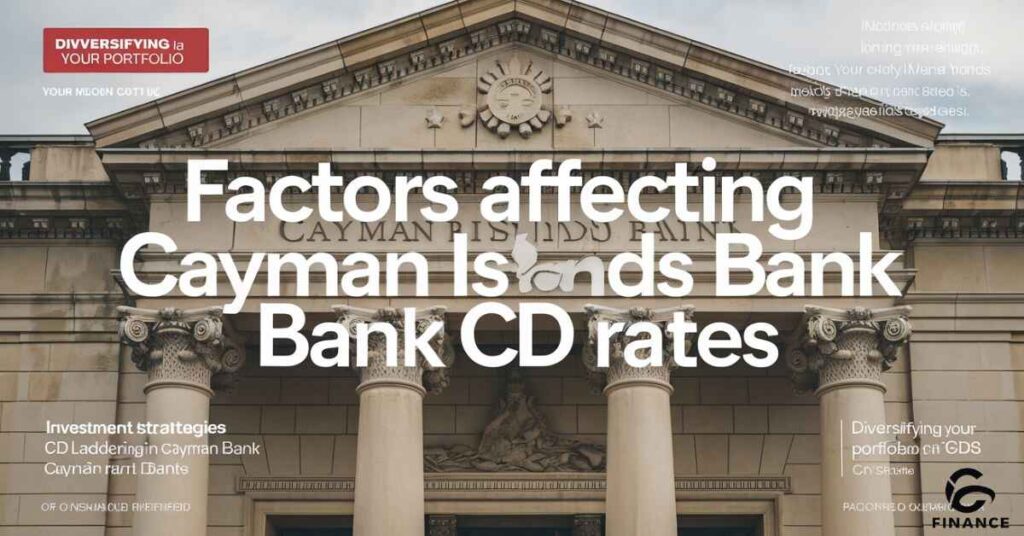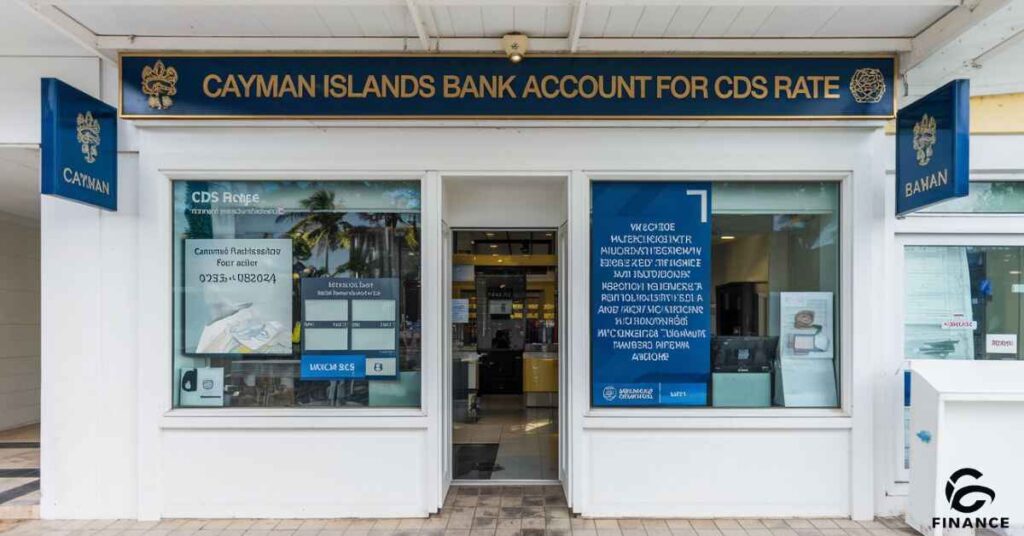Cayman Islands bank CD rates offer attractive savings opportunities, but navigating offshore banking can be daunting. Many investors miss out on potentially higher returns due to confusion about international financial regulations and account opening procedures.
This comprehensive guide demystifies Cayman Islands CD investments, addressing common concerns and providing clear, actionable information. We’ll explore the benefits of offshore banking in the Caymans, compare competitive CD rates, and outline steps to open an account.
Armed with this knowledge, you’ll be equipped to make informed decisions and potentially maximize your savings through Cayman Islands bank CDs.
What Are CD Rates?
CD rates are the interest banks pay on Certificates of Deposit. These are savings accounts where you agree to leave your money for a set period. In return, you get a higher interest rate than regular savings accounts. The bank guarantees this rate for the entire term. Terms can range from a few months to several years. Longer terms usually offer higher rates. CDs are considered low-risk investments, ideal for those seeking stable returns.
The Appeal of Cayman Islands Bank CD Rates
Cayman Islands CDs attract investors worldwide. They often offer higher rates than many onshore banks. The Cayman financial system is stable and well-regulated. This provides security for investments. Cayman banks frequently have lower operating costs.
This allows them to pass savings to customers through better rates. Many investors also appreciate the privacy laws in the Cayman Islands. These factors combine to make Cayman CDs an appealing option for diversifying savings.
Understanding Cayman Islands Offshore Banking
Offshore banking in the Cayman Islands involves opening accounts with banks outside your home country. The Cayman Islands are a major global financial center. They offer a range of banking services to international clients.
Cayman banks operate under strict regulations to ensure stability and security. Many large, reputable international banks have branches here. Offshore accounts can offer benefits like potentially higher interest rates and asset protection.
Why Choose Cayman Islands for Offshore Banking?
The Cayman Islands attract offshore banking for several reasons. The country has a stable political and economic environment. Its financial sector is well-regulated and adheres to international standards.
Cayman banks offer a wide range of services tailored to international clients. The islands have a highly developed banking infrastructure. Many financial institutions have a presence here. This competition can lead to better products and rates for customers.
The Zero Tax Advantage
The Cayman Islands offer a tax-neutral environment. This means there are no direct taxes on individuals or corporations. No income tax, capital gains tax, or wealth tax exists. This can be advantageous for investors seeking to maximize returns.
However, it’s crucial to note that investors may still have tax obligations in their home countries. Always consult with a tax professional about your specific situation.
Cayman Banking Privacy and Security
Cayman Islands banks prioritize client privacy and data security. Strict laws protect confidential information. Banks must follow robust Know Your Customer (KYC) and Anti-Money Laundering (AML) procedures.
This ensures the integrity of the financial system. Advanced cybersecurity measures protect digital transactions and data. Physical security at bank premises is also stringent. These measures aim to safeguard clients’ assets and information.
Exploring Cayman Islands Bank CD Rates
Cayman Islands banks often offer competitive CD rates. These rates can vary based on the bank, deposit amount, and term length. As of 2024, some Cayman CDs offer rates above 4% for certain terms. However, rates fluctuate with global economic conditions. It’s important to shop around and compare offers from different banks. Some banks may have tiered rates, offering higher rates for larger deposits.
Types of CDs Available in Cayman Banks
Cayman banks offer various CD products. Fixed-rate CDs are most common. These guarantee a set interest rate for the entire term. Some banks offer variable-rate CDs, where rates can change based on market conditions. Step-up CDs increase rates at predetermined intervals. Callable CDs allow the bank to end the CD early. Each type has its own benefits and risks. Consider your financial goals when choosing.
Comparing Cayman CD Rates to Other Offshore Locations
Cayman Islands CD rates often compare favorably to other offshore locations. For instance, in 2024, some Cayman CDs offer higher rates than similar products in Switzerland or Luxembourg. However, rates can vary widely between banks and change frequently. Factors like currency stability and local regulations also affect comparisons. It’s crucial to consider the overall financial landscape, not just rates, when comparing offshore options.
Factors Affecting Cayman Islands Bank CD Rates

Several factors influence CD rates in the Cayman Islands. Global economic conditions play a significant role. When world economies are strong, rates tend to be higher. Local competition among banks can drive rates up.
The US Federal Reserve’s decisions often impact Cayman rates, as many accounts are in US dollars. Inflation rates and currency fluctuations also affect CD returns. Banks adjust their rates based on their own financial needs and strategies.
Investment Strategies with Cayman CDs
To maximize returns with Cayman CDs, consider a few strategies. Spread your investments across different banks to get the best rates. Keep an eye on rate trends and be ready to act when rates are favorable.
Consider longer-term CDs for potentially higher rates, but balance this with your need for liquidity. Some investors use CD laddering to maintain flexibility while capturing higher rates. Always compare offers from multiple banks before investing.
CD Laddering in Cayman Banks
CD laddering is a smart strategy for Cayman investments. It involves buying multiple CDs with different maturity dates. For example, you might invest in 1-year, 2-year, and 3-year CDs. As each CD matures, you can reinvest at the current rates.
This approach provides regular access to your money while potentially earning higher interest. It also helps manage interest rate risk by not locking all your funds into one rate.
Diversifying Your Portfolio with Cayman CDs
Cayman CDs can be a valuable part of a diverse investment portfolio. They offer a stable, low-risk option for a portion of your savings. Cayman CDs can provide geographic diversification, spreading risk across different financial systems.
They may offer higher rates than domestic options. However, remember to balance CD investments with other assets like stocks or bonds. This helps manage overall portfolio risk and potential returns.
Long-term vs. Short-term CD Investments
Cayman banks offer both long-term and short-term CDs. Long-term CDs, typically over one year, often have higher interest rates. They’re good for funds you won’t need soon. Short-term CDs, usually under one year, offer more flexibility.
You can access your money sooner or reinvest at new rates. Long-term CDs risk locking in low rates if market rates rise. Short-term CDs might mean missing out on higher long-term rates.
Top Cayman Island Offshore Banks for CD Rates
Several Cayman banks offer competitive CD rates. As of 2024, top contenders include Butterfield Bank, Cayman National Bank, and RBC Royal Bank. These banks have strong reputations and offer a range of CD products. Rates and terms can vary significantly between banks. It’s important to compare offers and consider factors beyond just the interest rate, such as minimum deposits and early withdrawal penalties.
Bank A: Features and CD Offerings
Butterfield Bank, a major player in Cayman banking, offers attractive CD options. They provide terms ranging from 1 month to 5 years. As of 2024, their 1-year CD rate is competitive at 3.75% for deposits over $10,000. Butterfield offers online banking for easy account management. They have a strong reputation for customer service. The bank also provides wealth management services for larger investments.
Bank B: CD Rate Comparison
Cayman National Bank presents a strong alternative for CD investments. Their rates often compete closely with Butterfield’s. For instance, in 2024, their 2-year CD offers 4% interest on deposits over $25,000. Cayman National has lower minimum deposit requirements for some products. They also offer more flexible terms, including CDs as short as 7 days. This bank is known for its focus on local Cayman customers.
Bank C: Unique CD Products
RBC Royal Bank in Cayman offers some innovative CD products. They have introduced a “Flex Term Deposit” that allows partial withdrawals without penalty. As of 2024, their standard 3-year CD rate stands at 3.9% for deposits over $50,000. RBC also offers US dollar and Canadian dollar CDs, appealing to North American clients. Their global banking network provides additional services for international investors.
Opening Your Cayman Islands Bank Account for CDs

Opening a Cayman Islands bank account for CDs involves several steps. First, choose a bank that suits your needs. Contact them to inquire about their CD products and account opening requirements. Most banks allow you to start the process online or via email. You’ll need to fill out application forms and provide necessary documents. Some banks may require an in-person visit to complete the process. Be prepared for a thorough verification process due to international banking regulations.
Required Documentation
To open a Cayman Islands bank account, you’ll need several documents. These typically include:
- Valid passport
- Proof of address (utility bill or bank statement)
- Reference letter from your current bank
- Source of funds declaration
- Employment verification or business ownership documents
- Tax identification number from your home country
Some banks may request additional documents. All documents usually need to be notarized or certified. The bank will guide you on specific requirements.
Minimum Deposit Requirements
Minimum deposit requirements for Cayman CDs vary by bank and product. As of 2024, typical minimums range from $10,000 to $50,000. Some banks offer lower minimums for certain products, starting around $5,000.
Higher deposits often qualify for better rates. For example, a $100,000 deposit might earn 0.25% more than a $10,000 deposit. Always check current requirements, as banks may change their policies.
Account Opening Process
The account opening process for Cayman CDs typically follows these steps:
- Initial contact with the bank
- Submission of application forms
- Providing required documents
- Bank’s review and verification process
- Approval of the account
- Initial deposit transfer
- CD purchase and confirmation
This process can take several weeks due to thorough background checks. Some banks may require a phone or video interview. Be patient and responsive to any additional information requests from the bank.
Risks and Considerations
Investing in Cayman Islands CDs carries some risks. Political changes could affect banking regulations. Economic shifts might impact interest rates. There’s also the risk of currency fluctuations if you’re not investing in your home currency.
Some investors worry about the safety of funds in offshore accounts. It’s crucial to choose reputable banks and understand your home country’s tax laws regarding offshore investments. Always consider these factors alongside potential benefits.
Read This Blog: Calculate the Rate Of Return: A Comprasive guide
Regulatory Compliance
Cayman Islands banks follow strict international regulations. They adhere to global anti-money laundering (AML) and counter-terrorism financing (CTF) standards. Banks must report large transactions to relevant authorities.
Account holders often need to comply with their home country’s offshore account reporting requirements. For example, US citizens must file FBAR reports for accounts over $10,000. Stay informed about your obligations to avoid legal issues.
Currency Exchange Risks
When investing in non-USD Cayman CDs, be aware of currency exchange risks. If your home currency strengthens against the CD’s currency, your returns may decrease when converted back. For example, a 5% return on a British pound CD could become a loss if the pound weakens significantly against your home currency. Some investors use multi-currency accounts or hedging strategies to manage this risk. Consider consulting a financial advisor for guidance.
Deposit Insurance Considerations
Unlike many countries, the Cayman Islands don’t have a government-backed deposit insurance scheme. This means your CD investments aren’t protected in the same way as in countries with such programs.
However, Cayman banks are well-regulated and typically have strong financial positions. Some banks may offer private insurance for large deposits. When choosing a bank, consider its financial strength and reputation. Diversifying across multiple banks can also help manage risk.
Maximizing Your Cayman Islands CD Investment
To get the most from your Cayman CDs, consider a few key strategies. First, compare rates across multiple banks to find the best deals. Look for promotional rates, which can be significantly higher. Consider longer-term CDs for potentially higher yields, but balance this with your need for liquidity. Use CD laddering to maintain flexibility while capturing higher rates. Stay informed about economic trends that might affect rates. Don’t forget to factor in any fees when calculating your potential returns.
Also Read: Cavendish Finance Hong Kong: Leading Financial Solutions for Investors
Negotiating Better Rates
While CD rates are often fixed, there’s sometimes room for negotiation, especially with larger deposits. Start by researching current market rates. Then, approach your chosen bank with this information. If you’re making a substantial deposit or have a strong banking relationship, you may have more leverage.
Consider asking about special rates for new customers or loyalty bonuses. Be prepared to discuss your investment goals and timeline. Remember, even a small increase can make a big difference over time.
Utilizing Multiple Banks
Spreading your CD investments across different Cayman banks offers several benefits. It allows you to take advantage of the best rates from various institutions. This strategy also helps manage risk by not putting all your funds in one bank.
You can more easily create a CD ladder using different banks’ products. Some banks may offer unique features or better rates for specific term lengths. By diversifying, you’re better positioned to optimize your overall returns.
Staying Informed on Rate Changes
Keeping track of Cayman CD rate changes is crucial for making informed decisions. Subscribe to financial newsletters focusing on offshore banking. Follow reputable financial news websites for updates on global interest rate trends.
Many Cayman banks offer email alerts about rate changes. Set up a spreadsheet to track rates from different banks over time. Consider using financial comparison websites that monitor offshore CD rates. Regular check-ins with your banker can also provide valuable insights into upcoming rate changes.
Future Outlook for Cayman Islands Bank CD Rates
The future of Cayman Islands CD rates depends on several factors. Global economic conditions play a significant role. As of 2024, experts predict a period of relative stability in rates. However, any major changes in US Federal Reserve policies could impact Cayman rates.
Increasing competition among Cayman banks might lead to more attractive rates. Regulatory changes could also affect the banking landscape. While precise predictions are challenging, Cayman CDs are likely to remain an attractive option for many investors seeking stable returns.
FAQ
What are the current Cayman Islands bank CD rates?
As of 2024, Cayman Islands bank CD rates typically range from 3% to 5%, depending on the term length and deposit amount. Rates can vary between banks and are subject to change based on market conditions.
How do I open a Cayman Islands bank account for CDs?
To open a Cayman Islands bank account for CDs, contact a Cayman bank, complete their application form, and provide required documents like passport, proof of address, and source of funds. Some banks may require an in-person visit to complete the process.
Are Cayman Islands bank CD rates taxable?
Cayman Islands does not impose taxes on CD interest. However, you may be required to report and pay taxes on this income in your home country, depending on local tax laws.
What is the minimum deposit for a Cayman Islands CD?
Minimum deposits for Cayman Islands CDs typically range from $10,000 to $50,000, depending on the bank and specific CD product. Some banks may offer lower minimums for certain accounts.
How does Cayman banking privacy work?
Cayman banking privacy laws protect client information from unauthorized disclosure. Banks must follow strict confidentiality rules, but also comply with international anti-money laundering regulations and legal information requests.
Can US citizens invest in Cayman Islands CDs?
Yes, US citizens can invest in Cayman Islands CDs. However, they must report these accounts to the IRS and may need to file additional forms like the FBAR (Foreign Bank Account Report).
Conclusion
Cayman Islands bank CDs offer attractive rates and privacy benefits for international investors. However, it’s crucial to understand the risks, regulatory requirements, and tax implications before investing.
By carefully selecting banks, comparing rates, and staying informed about market trends, you can potentially maximize your returns. Remember to consider factors like minimum deposits, term lengths, and currency risks.
Always consult with a financial advisor to ensure Cayman CDs align with your overall investment strategy and comply with your home country’s tax laws.

Howdy, editor at FinanceEon.com, brings over a decade of financial journalism experience. He ensures accuracy and insightful analysis, guiding a team on market trends and investment strategies.







